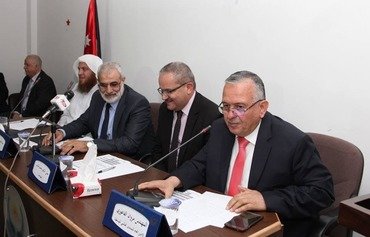Extremist groups use assassinations as a tactic to silence moderate voices opposing their ideology, according to counter-terrorism and security experts attending a September 1st symposium in Cairo.
The Egyptian Centre for Combating Terrorism organised the "Assassinations and Terrorism" symposium in conjunction with Beni-Suef University to examine the history of extremist groups using assassination as a tool to silence opposition.
Symposium participants, including high-profile security and terror group experts, retired military officers, politicians and journalists, discussed the recent assassination attempt targeting former Grand Mufti of Egypt Sheikh Ali Gomaa .
The August 5th attempt on Gomaa's life provides strong evidence that extremist groups reject moderate Islam, they said.
Gomaa, a member of the Council of Senior Scholars who served as Grand Mufti from 2003 through 2013, was attacked at the entrance of al-Fadel mosque in 6th of October City, where he was scheduled to lead Friday prayers.
The best way to eradicate terrorism, participants agreed, would be to focus on large-scale economic and social solutions in addition to bolstering security.
"The symposium came in response to the assassination attempt on former Mufti of Egypt Ali Gomaa and is part of a series of events that the university is taking part in to confront terrorism and terrorist ideology," said Beni-Suef University president Amin Lutfi.
The meeting shed light on some past assassinations in addition to discussing the latest attempt targeting Gomaa.
The attempt on Gomaa's life "was assessed and analysed, and recommendations and suggestions were raised that would benefit the relevant security authorities in drying up the sources of terrorism", he said.
Going forward, he added, it will be important for religious, cultural, educational and government institutions to agree on joint steps to confront extremist ideology.
Silencing opposing voices
"Terrorist groups resort to assassinations at all times," said reformed jihadist Nabil Naeem, a co-founder of the Islamic Jihad movement in Egypt.
This is evident with the spread of groups such as al-Qaeda and the "Islamic State of Iraq and the Levant" (ISIL) and the ideologies they espouse, he said.
The primary reason these groups commit such acts is to "silence any opposing voices, especially influential voices belonging to journalists, politicians and clerics", he told Al-Mashareq on the sidelines of the symposium.
These groups employ brainwashing techniques to spread their ideas, he said, and seek to silence any influential voices that go against their ideology.
Additionally, Naeem said, assassination operations are considered "a promotional tool for terrorist groups to demonstrate their cruelty and tyranny".
"They use this method to bolster recruitment, to the extent that some terrorist groups boast among themselves on media platforms about the number of assassinations they have committed," he said.
Naeem underscored the need to combat terrorist groups in the ideological and cultural arena by banning the spread of their publications and prosecuting those who promote them.
This should be coupled with the release of carefully vetted counter publications that explain how extremist groups are trying to radicalise people, he said, with an emphasis on youth, as they are the main target of extremist groups.
Exploiting socio-economic conditions
Terrorism cannot be eradicated through security operations alone, said security expert and retired Egyptian military officer Maj. Gen. Fouad Allam.
The root causes driving young people to join terror groups must be addressed, he said, foremost among them economic strife.
"These groups are primarily known for taking advantage of the low socio-economic status of certain segments of society for their recruitment efforts by brainwashing them and inculcating them with distorted religious ideas," he said.
Allam also stressed the central role media outlets play in combating terrorism by ensuring they do not inadvertently provide a platform for the negative press extremist groups seek.

![Participants at a September 1st symposium in Cairo discuss the use of assassinations by extremist groups to silence moderate voices. [Waleed Abu al-Khair/Al-Mashareq]](/cnmi_am/images/2016/09/16/6190-Egypt-cairo-symposium-600_384.jpg)






